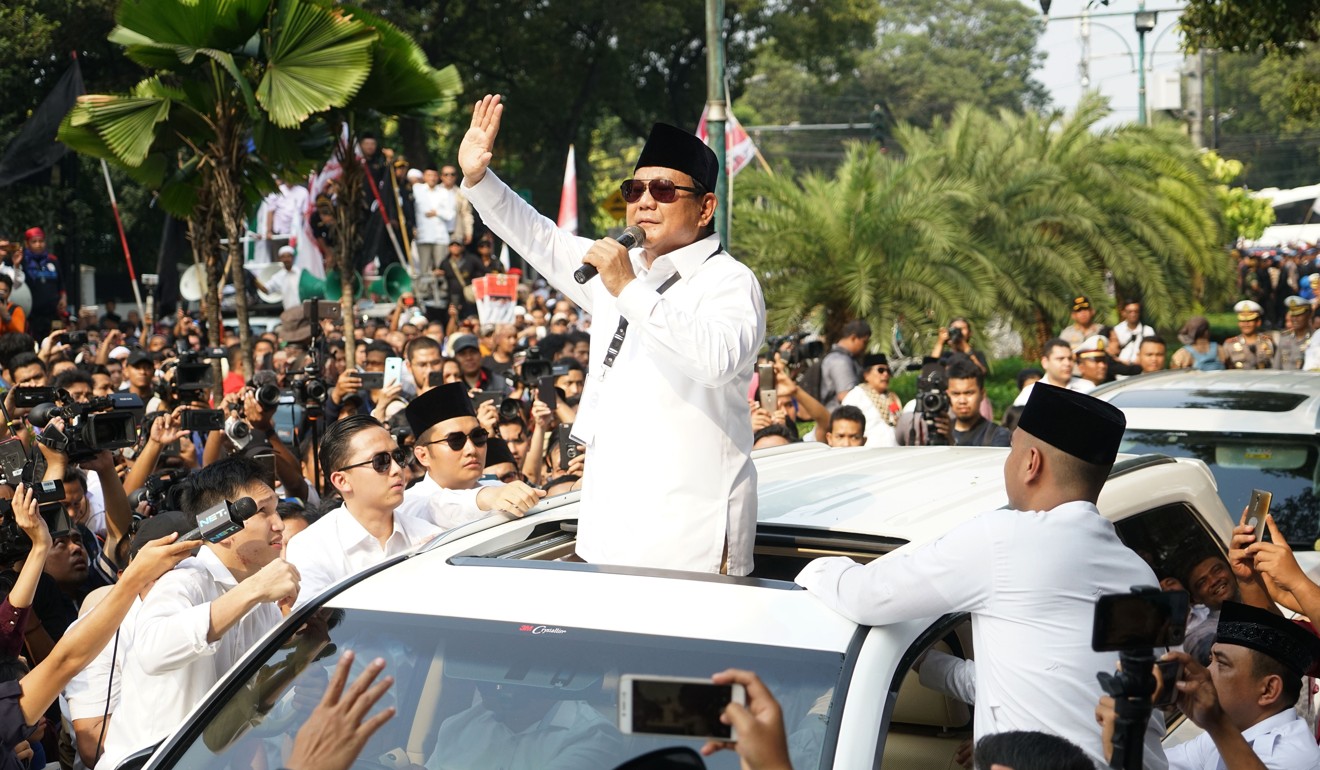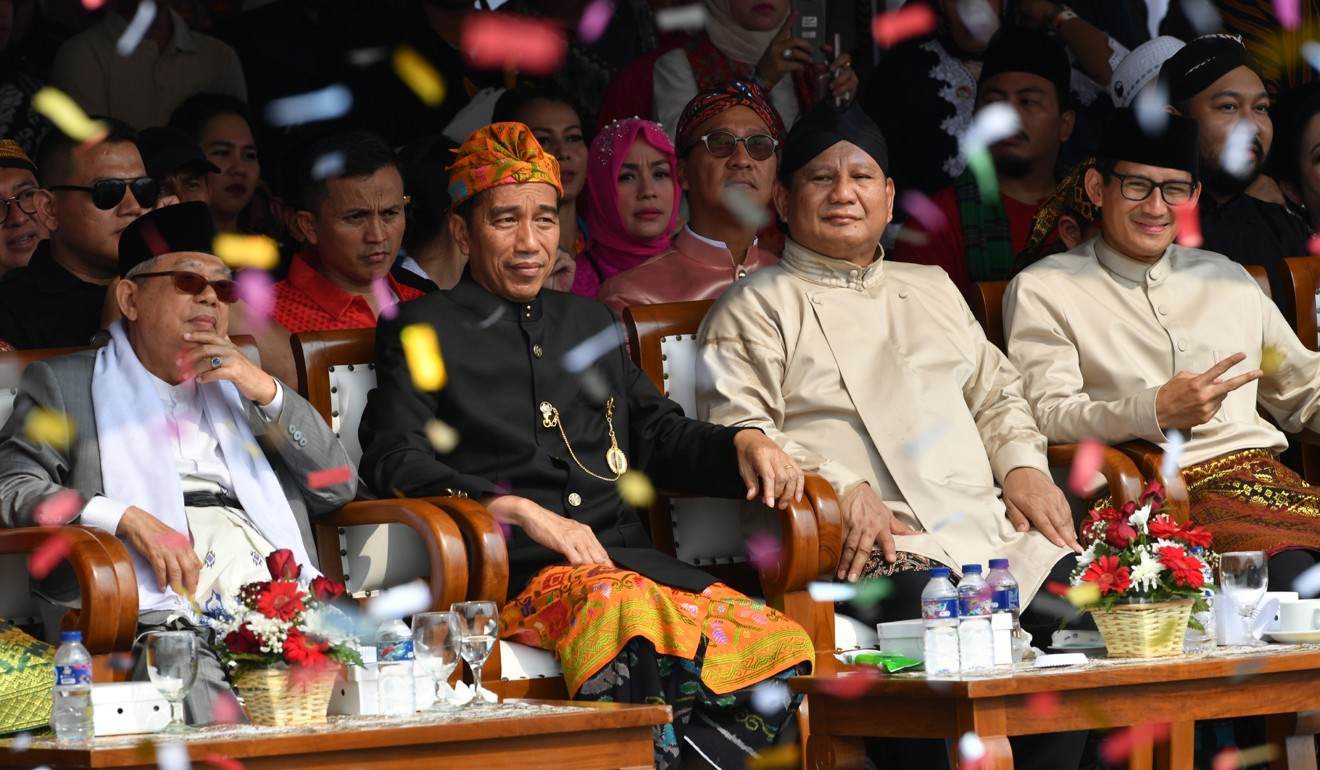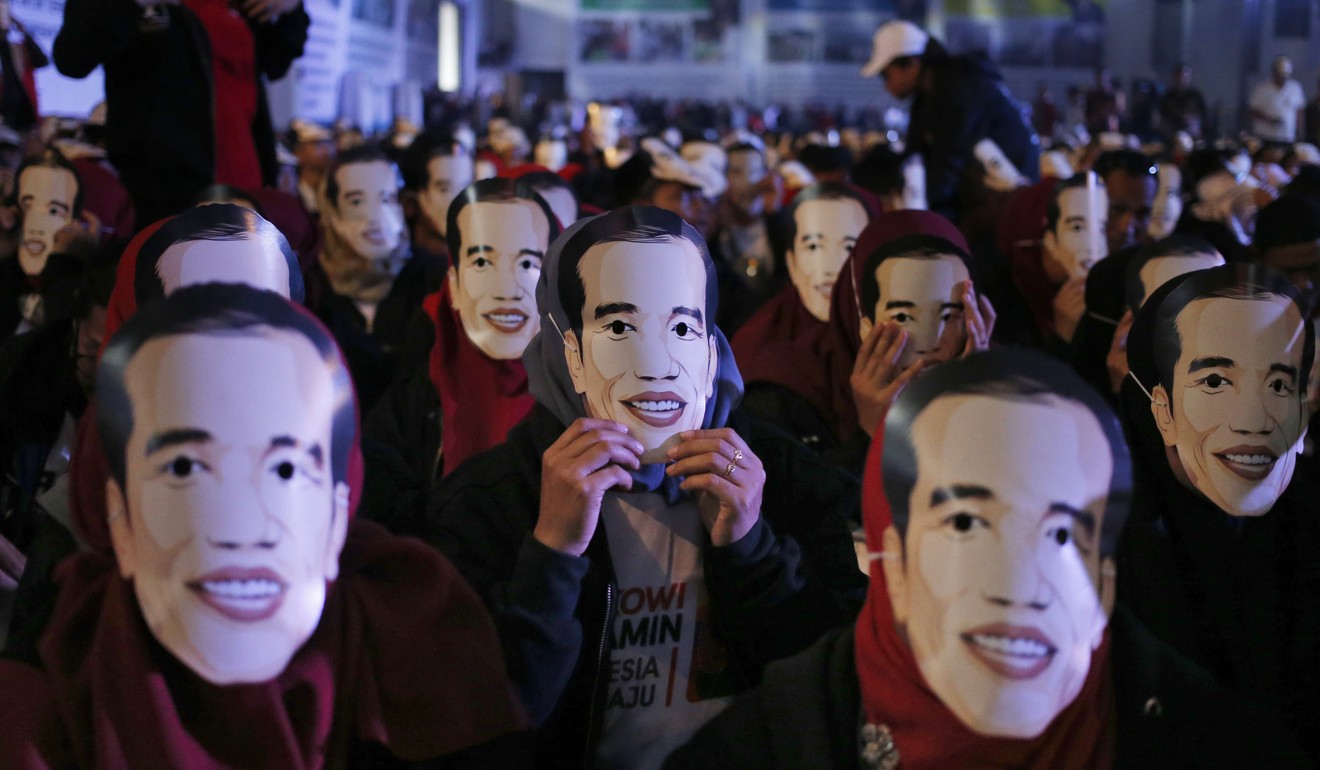
Indonesia’s election showdown: Prabowo woos ethnic Chinese, Jokowi banks on distaste for his competitor
- Prabowo’s ties with a community once wary of him reflects how his appeal may be broader than previously thought
- Jokowi is tipped to win, but the economy, millennials and views on whether he deserves a second term will be deciding factors, observers say
AS THE STRAINS of Taiwanese star Teresa Teng’s hit song The Moon Represents My Heart filled a ballroom in North Jakarta last month, an array of mobile phones were trained on the singer, Titiek Suharto.
The pair were at a dinner organised by ethnic Chinese businessmen. Prabowo – accused of human rights violations during the Suharto era, and the commander of military forces in Jakarta in May 1998 when deadly anti-Chinese riots broke out – was the special guest.
In his speech, the 67-year-old said: “If I am elected and accept the mandate, I understand that I must be a leader for all cultures, religions, races and ethnic groups.”
He stressed he did not view Indonesian Chinese, who make up about 2 per cent of the country’s 260 million population, differently from other citizens.
At the Sun City Luxury Club that night, 16 businessmen donated 460 million rupiah (US$32,000) to Prabowo’s election campaign.
He and multimillionaire entrepreneur Sandiaga Uno will face incumbent president Joko Widodo – also known as Jokowi – and Islamic scholar Ma’ruf Amin in the April 17 election.
Asia in 2019: buckle up for a year of uncertainty and volatility
Suraydinata pointed out the dinner attendees were not fixtures on the annual Forbes list of uber-rich – the super-wealthy would not align themselves publicly with either side, instead hedging their bets to protect their business interests.
“But small and medium-sized business owners would have no such qualms and in truth, no one would know their identities,” he observed.

Prabowo’s breaking bread with members of an ethnic group once wary of him is a reflection of how his appeal may be broader than pollsters currently give him credit for.
In 2014, Prabowo and his running mate Hatta Rajasa secured 47 per cent of the vote, winning in 10 of Indonesia’s 34 provinces, including the populous West Sumatra, West Java and Banten.
Surveys since campaigning began some three months ago have shown the Prabowo-Sandiaga pair trailing Jokowi-Ma’ruf – last month, the Indonesian Survei Network found 54 per cent of 1,200 people polled would choose Jokowi and 31 per cent Prabowo. The rest were undecided or did not answer.
Thai elections: people want a fair vote and ‘real PM’, but will they get them?
The upcoming contest, however, is not a straight rematch between two populists of different moulds – the “rabble-rousing and combative” Prabowo and “inclusive … and unusually polite” Jokowi, as Australian National University academic Marcus Mietzner described them in 2014.
As The Jakarta Post’s senior editor Endy Bayuni explained in an op-ed last August, voters will not be ruminating over whether an untested Prabowo would make a better president: “It is really about whether Jokowi has done such a good job in the last five years that he deserves a second term.”
By most measures, Jokowi – a furniture businessman turned technocrat – has acquitted himself well. He has undershot his pledge of 7 per cent annual growth but launched some reforms and infrastructure projects while doubling down on social welfare – establishing free universal health care, retaining domestic oil subsidies, and giving conditional cash subsidies to the poor.
How price of sugar could swing the Indonesian election - bittersweet for Widodo
Handouts this year, to be distributed this month and in April, will double to 38 trillion rupiah (US$2.6 billion) for 10 million families.
Sandiaga, a 49-year-old with boyish good looks, has helped on that front, criticising the government for rising consumer prices while promising voters more jobs.

Jokowi and Prabowo have both insured themselves in a climate of heightened identity politics by picking vice-presidents affiliated with influential Islamist groups. This has blunted the capacity for sectarian tensions “to be deployed as a deeply polarising tool”, according to Kevin Evans from the Australia-Indonesia Centre.
Religion has always been a decisive factor in majority-Muslim Indonesia’s domestic politics, but its multi-faith society was put to the test when Islamic hardliners and conservatives staged massive demonstrations against ethnic Chinese Jakarta governor Basuki Tjahaja Purnama, or Ahok, in 2016. While campaigning for a second term, Ahok said he believed the Koran did not ban Muslims from electing non-Muslims. In 2017, he was convicted of blasphemy and jailed for two years.
Will Lee Hsien Loong call for an early election?
Ma’ruf, then leader of the Indonesian Ulema Council, Indonesia’s top Muslim clerical body, declared Ahok’s comment blasphemous during his trial. When Jokowi picked the cleric, moderates and liberals balked, but the president’s cache with conservatives got a boost.
Prabowo’s supporters include the groups that rallied for Ahok’s downfall, and Sandiaga is a poster boy for the growing swathe of urban middle-class Muslims. Ella Prihatini of the University of Western Australia’s Public Policy Institute said he has also striven to win support from women.
“This strategy is also important, as women comprise 50.07 per cent of eligible voters and some studies suggest that their participation rates are higher than men,” Ella said.
The LGBTI rights crisis unfolding before Indonesia’s elections
But no political watchers are declaring an easy victory for Jokowi. Evans, in a report last September on the Indonesian election, said the state of the economy could affect the incumbent, especially if oil prices rise and net importer Indonesia is forced to backtrack on its promise to keep fuel prices low.
There is also uncertainty around how millennials, seen as disenchanted with the political establishment, will vote. Data from the General Elections Commission suggests those 40 and under make up 54 per cent of the 192 million voters, according to Ella.

Evans noted Prabowo had been an “energetic and animated performer” on the hustings during the past decade, an important quality to enthuse voters and motivate them to cast their ballots.
“The peoples’ expectations are rising faster than delivery. I’m not sure that Jokowi’s team is effectively communicating what they’ve achieved ... one gets a sense of a kind of funk, people just don’t seem to be feeling as excited or inspired, particularly the business community.
India’s election will test limits of Narendra Modi’s populism
“I certainly don’t believe it’s fatal for Jokowi’s election prospects but it should give campaign strategists pause for thought about how to better connect with the electorate,” he said.
Political scientist Yohanes Sulaiman said the biggest threat to Jokowi is the lack of enthusiasm from his traditional voter base of secularists and religious moderates due to his selection of Ma’ruf. Support for Jokowi on social media has been insipid compared to the declarations of change he would bring in 2014; in fact, Prabowo’s followers have been more vocal. A hashtag campaign #2019GantiPresiden or #2019ChangePresiden started last March was met with a weak counter effort by Jokowi’s team.
Happy halaldays: how Asia became a tourist Mecca for Muslims
“I think that group would either abstain or at least hold their collective noses and vote for Jokowi when it’s time, just to spite the Islamists. But that’s a slender thread of hope to rely on,” said Sulaiman, who teaches at Jenderal Achmad Yani University in West Java.
The face of fake news: Indonesia’s latest disinformation scandal
Jokowi could “waltz to victory” if there are no economic shocks out of his control, like a worsening US-China trade war – but to secure his win he will need to proactively mobilise supporters and inspire them once again, Sulaiman said.
“He may feel he doesn’t need to push too hard. But I’ve never seen an election won resoundingly just by a candidate defending their position.” ■

